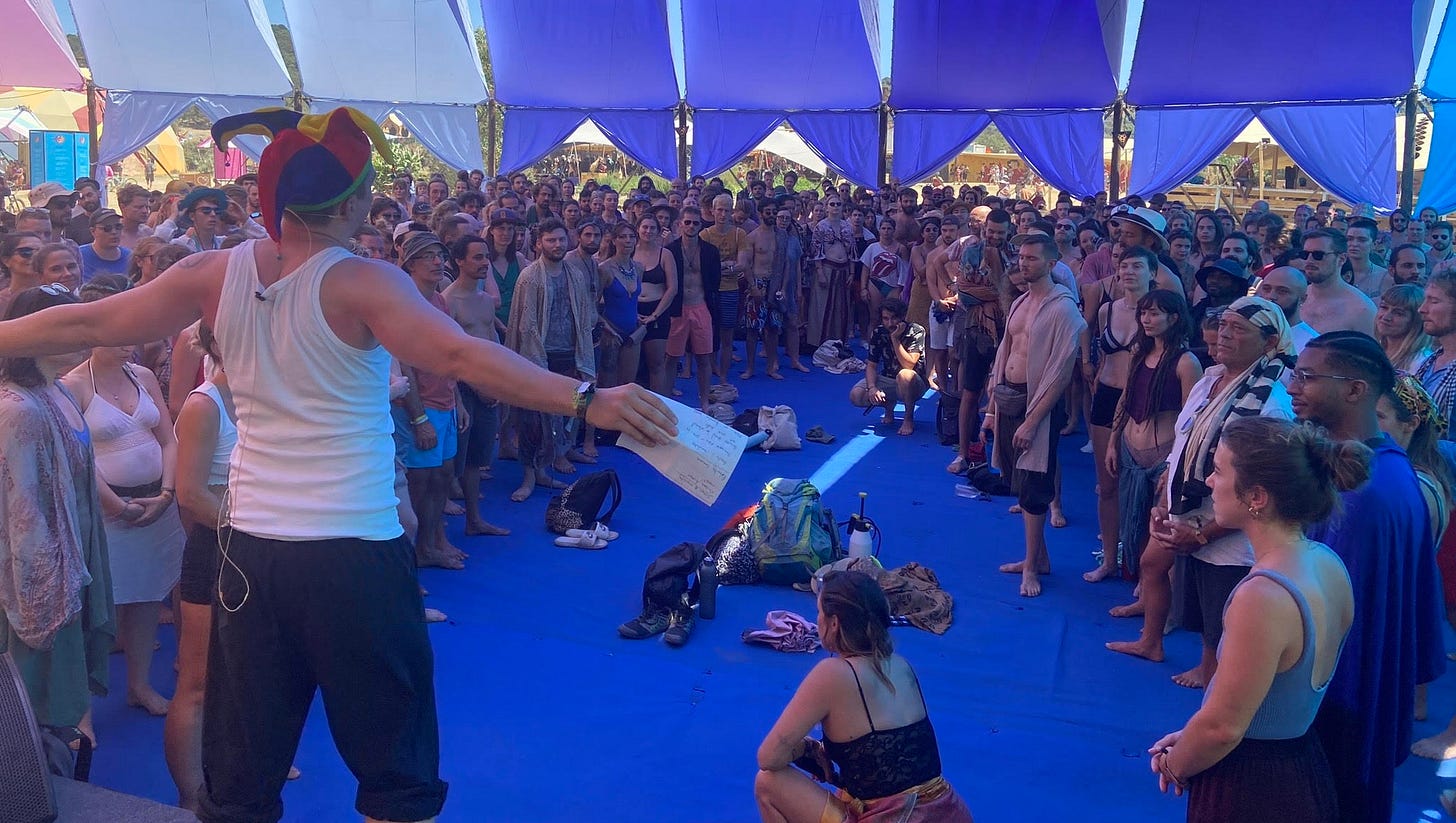Announcing Embodied Sensemaking: a small-cohort training designed to help you apply powerful dialogue and embodiment practices to making sense of culture, politics and relationships.
It’s a strange time to be alive. Our devices are tearing us away from the reality of the senses, plunging us into vibrant ‘otherworlds’ where our fantasies and ideologies can remain blissfully detached from the reality of mountains, stars and soil.
One of the taglines for Apple’s new Vision Pro is ‘Stay connected to people around you’, but in the week of its launch, the internet was flooded with images of strange android figures gesturing to invisible worlds while sitting in a cafe or driving. You couldn’t make it up… unless you were an Apple marketing executive.
The spaces where we debate ideas, explore new ways of thinking, and speak to the people we love are moderated by technologies designed for distraction, addiction and division. It’s no surprise that at a time when we need real conversation more than ever - a time of crucial elections, creeping techno-fascism and environmental tipping points - collective dialogue is becoming more polarised, more numbed out, and more disheartening.
Without real conversations that embrace the complexity we’re living through, any meaningful co-ordination at scale is impossible. Topics like sex and gender, immigration or the environment get stuck in endless arguments about disputed facts from entrenched ideological positions.
Facts matter, but to have authentic conversations we have to learn how to speak with our whole being. To connect with one another as humans, and approach the act of speaking itself with a deep curiosity, flexibility and creativity. To be aware of what’s happening within us while we’re in dialogue, so that our connection takes us beyond false certainties and into new territory.
It all begins by embodying an attitude of 'I don't know'.
What is Embodied Sensemaking?
I’m launching my first training course, Embodied Sensemaking, to share some of the practices and techniques I’ve developed to bring cultural conversations into new territory. Inspired by wisdom traditions, embodiment practices and my counselling training, they’ve been honed through years facilitating workshops, retreats and creating spaces for cultural conversations.
The training is limited to a small cohort of 36 people, and designed to give you unique practices that, in the words of John Vervaeke, help us to 'commune while we’re communicating' about what’s going on in the world today.
One of my long-standing frustrations is that people interested in personal growth and spiritual practices often shy away from difficult political topics, while people interested in debating politics often shy away from personal development and spirituality. Workshops and retreats are full of powerful psycho-technologies that help us deepen our knowledge of ourselves. However, they can also transform our understanding of what’s going on between us collectively. If we only focus on improving ourselves, we overlook vital practices for making sense and acting wisely in the times we live in.
Eventually, we have to stop focusing inward and instead look up. To bring our gaze out to the world and engage whole-heartedly with the chaos we find in our social feeds and the nightly news.
I've spent years experimenting with ways to bridge this gap, and this training brings together what I've learned. The core practice we’ll be learning is Embodied Inquiry; a type of talking meditation (or dialogos practice) which has been fundamental to all of the retreats and workshops I've run. Over time, I've also developed new techniques like Curiosity Hacking, Psychedelic Sensemaking and Clay Manning (which was developed from the work of Trish Blain). Each of them begins with coming back to the body as the source of our perception, and each helps us to expand our perspective into new territory in a different way.
I’ve used these practices in workshops, retreats and courses for thousands of people around the world. They were foundational to the work we did at Rebel Wisdom, and more recently I've used them while facilitating The Protopia Lab, encouraging people from different sides of the political divide to discuss polarising topics. Last summer, I drew on them to help 200 people debate Covid in public, and regularly work with household name corporate clients to embed these ways of seeing and being into the workplace.
In this training, I’m going to teach several techniques as an integrated practice, which I’m calling Embodied Sensemaking. This is a training, not a course. It’s designed to give you a solid foundation in a new ecology of practices that you can apply to your own life, work and relationships. If you work with people or as a facilitator, you'll leave with a new set of tools to draw on. If you’re more interested in learning how to approach polarising topics, these are techniques you can apply in day to day conversations.
The Experience
The training begins with a half-day deep dive on Sunday, March 3rd and runs for six weeks (four group sessions divided by two practice weeks).
In our Deep Dive, we’ll explore the core foundations of Embodied Sensemaking: curiosity, positive regard and somatic awareness. You’ll deepen your ability to track changes in your body as you speak, and learn the difference between inquiry and conversation. I’ll introduce the practices that make up Embodied Sensemaking one by one, explaining when they’re useful and why. You’ll partner with others in breakouts to practice what you're learning, and have plenty of space to experiment and ask questions.
For the next two weeks, we'll meet for two hours on Wednesdays to explore our first two topics, Politics and Culture. These will be interactive teaching sessions with multiple breakouts where we'll be inquiring into specific stories in the news that week, and wider political issues using the tools you're developing.
During the two practice weeks, you’ll be partnered up with four others on the course (two inquiries per week for four total) and have time to do some recommended reading, watching and listening. We'll then return as a group for two more Wednesday sessions on Technology and the Metacrisis.
By the end of the training, you will have a solid foundation in how to combine dialogos with popular culture. You’ll know how to incorporate multiple practices into your existing projects or work with people, embed them into your relationships, or simply use them to deepen your own understanding, empathy and insight.
Whatever your goals, it's a training that will teach you powerful tools of inquiry and how to bring them to a world that desperately needs new ideas and timeless wisdom.





